
AI Tools for Sales Managers: Top 7 Picks for 2025
Becca Eddleman
B2B sales has never moved faster, or felt more overwhelming. Sales managers are now juggling more tools, touchpoints, and data than ever before, all while trying to coach sales reps, forecast accurately, and deliver consistent revenue results.
That’s where AI tools for sales managers are stepping in. These technologies aren’t just nice-to-have anymore – they’re becoming the operational backbone of high-performing sales teams. From automating repetitive admin work to unlocking deep performance insights, AI is helping sales leaders spend more time where it counts: enabling their reps and closing deals.
In this article, we’ll cover:
- How AI transforms sales management workflows and productivity
- The 7 most effective AI sales tools available in 2025
- Real-world data proving their impact on coaching, win rates, and efficiency
- Tactical advice for implementation
Related Content: 27 Best AI Sales Tools for 2025
The Rise of AI in Sales Management
Administrative burden is the bottleneck
Despite the ever-growing sales tech stack, most sales managers still spend an inordinate amount of time buried in administrative work – report generation, CRM updates, status meetings. This administrative burden is inefficient and a misallocation of talent. Managers should be coaching reps, diagnosing deal health, and helping their teams win, instead of reconciling pipeline reports for the third time this week.
That bottleneck is just where AI comes in. With proper tools, managers can automate data aggregation, surface trends without digging through dashboards, and cut the time spent on status updates in half.
What AI actually does
A common misconception about AI in sales is that it deals only with automation – but it’s more capable than that. Today’s leading AI sales tools help with three core functions:
-
- Sales Automation: Repetitive tasks like meeting notes, follow-up emails, and data entry are offloaded to AI, freeing managers and reps to focus on revenue-generating work.
- Sales Analytics: AI can detect patterns in deals, sales calls, and pipeline health that humans would miss, or only spot too late.
- Sales Enablement: AI delivers proactive insights, coaching moments, and performance nudges exactly when needed, helping reps improve in real time.
AI is transforming workflows, and we need to keep up with it.
Strategic impact on sales performance
AI sales tools can make teams faster and smarter. Sales managers gain visibility into rep behavior, buyer sentiment, and deal risks with unprecedented clarity, which changes how teams are managed, coached, and held accountable.
It also shifts the sales manager’s role from reactive to strategic. Instead of chasing lagging indicators, managers become drivers of real-time course correction. The result is better coaching, faster pipeline movement, and higher rep performance – all at scale.
7 AI Tools Sales Managers Should Know in 2025
1. Salesforce Sales Cloud: AI-powered CRM leader
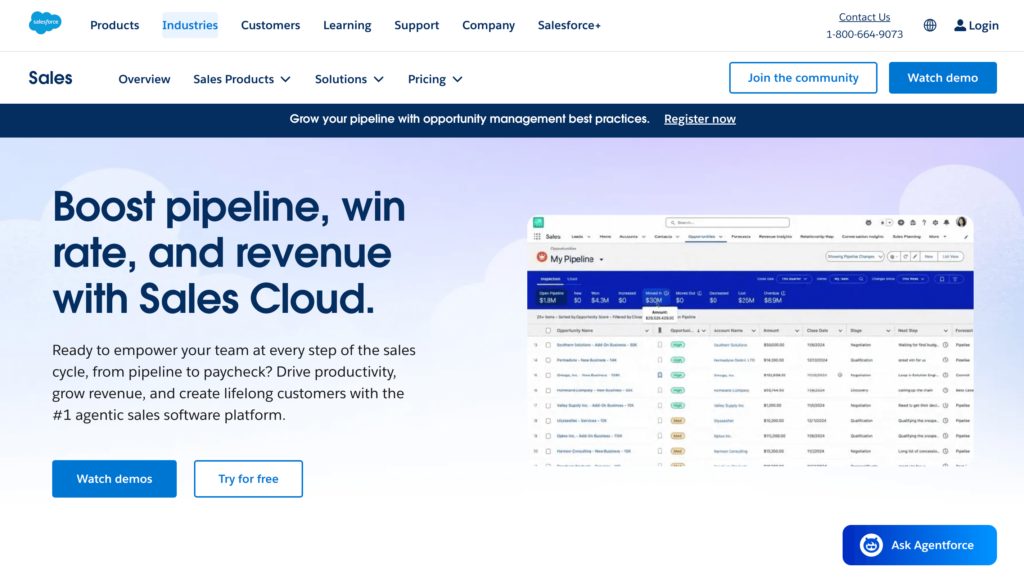
-
- What it is: A leading CRM platform integrating Einstein AI for enhanced data analysis and sales automation.
- Why it matters: Provides predictive insights into pipeline health and sales performance, making forecasting and rep prioritization more data-driven.
-
Key features:
- AI-powered sales forecasting
- Lead and opportunity scoring algorithms
- Automated data capture
- For example: A sales manager uses Einstein’s predictive forecast dashboard to identify which deals are likely to close this quarter and reassigns rep focus to higher-likelihood opportunities, improving close rates.
Explore Salesforse Sales Cloud
2. HubSpot Sales Hub: user-friendly AI sales platform
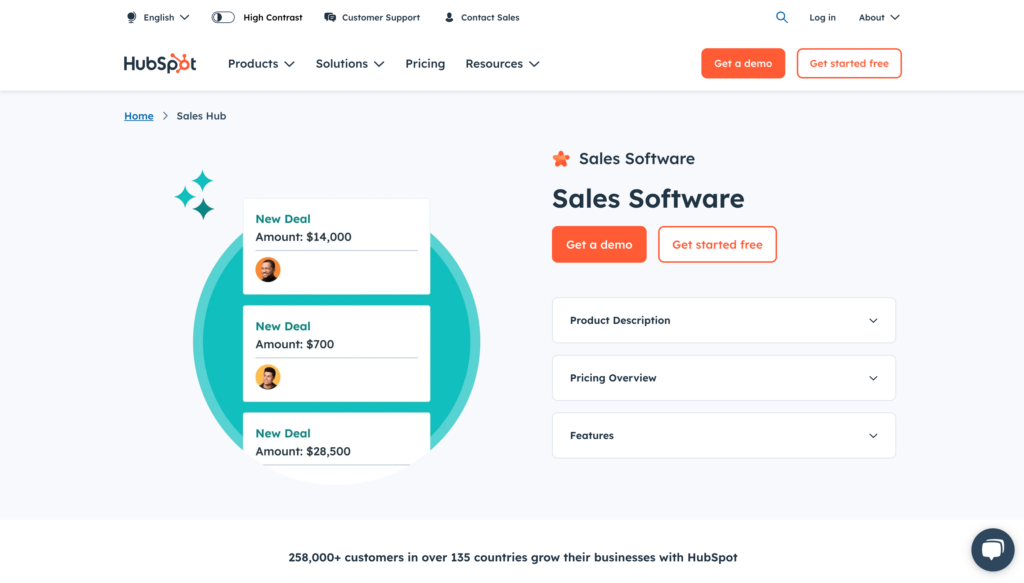
-
- What it is: A user-friendly CRM suite designed to help sales teams automate outreach and accelerate deal closure.
- Why it matters: Helps managers enforce consistent follow-up, automate busywork, and monitor performance without adding overhead to daily workflows.
-
Key features:
- Predictive lead scoring models
- AI-generated email templates
- Sales automation workflows
- For example: Sales managers setting up new SDRs can use HubSpot’s AI email templates and lead scoring to ensure fast onboarding and effective early outreach.
3. Clari: revenue operations AI platform
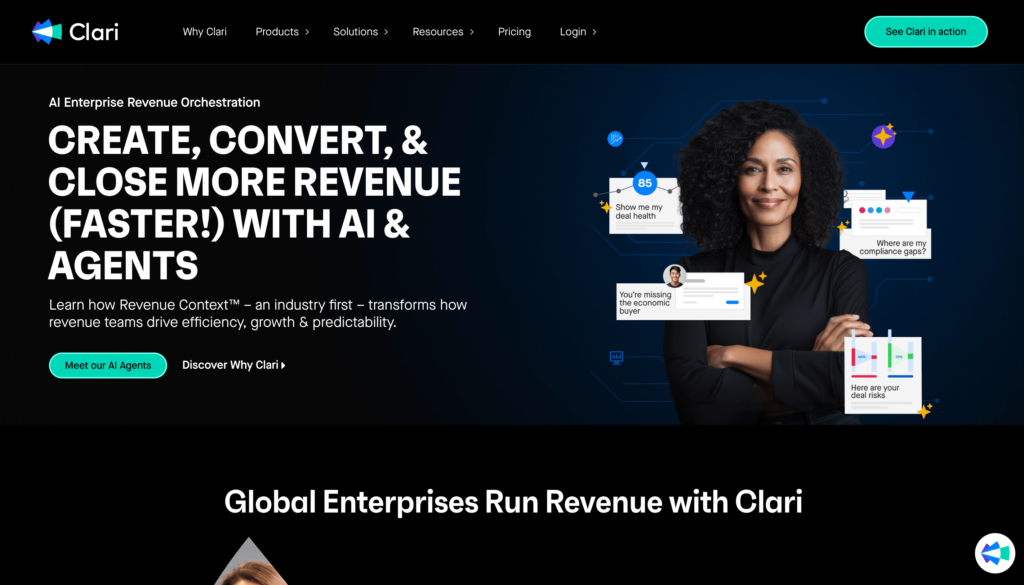
-
- What it is: A revenue operations platform designed to align go-to-market teams and deliver real-time visibility into forecasting.
- Why it matters: Equips managers with deal health scores and timeline tracking to reduce risk and forecast more accurately.
-
Key features:
- AI-driven pipeline and forecast health scores
- Deal inspection and engagement signals
- Predictive revenue analytics
- For example: A manager notices multiple deals are flagged “at risk” in Clari due to lagging buyer engagement, giving them time to intervene or reallocate pipeline expectations.
4. Gong.io: conversation intelligence platform
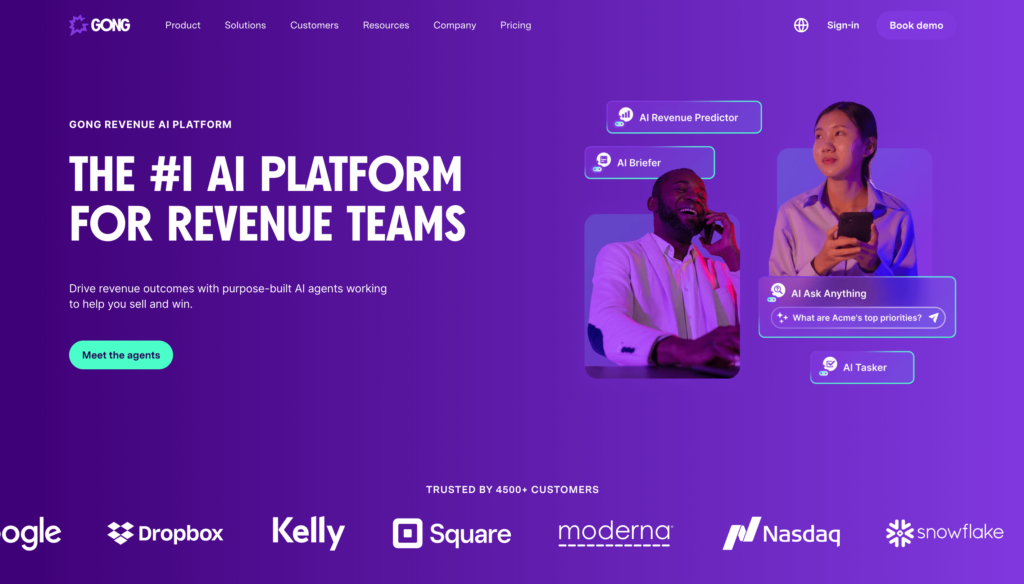
-
- What it is: A conversation intelligence platform that records, transcribes, and analyzes sales calls using AI.
- Why it matters: Enables sales managers to scale coaching, uncover deal risks, and track rep behavior trends across the funnel.
-
Key features:
- AI analysis of call sentiment and talk ratios
- Smart Trackers for objection and keyword monitoring
- Deal intelligence dashboard
- For example: After reviewing a set of rep calls in Gong, a manager notices a pattern of poorly handled pricing objections and sets up targeted coaching sessions, resulting in higher close rates.
5. Outreach: sales engagement automation
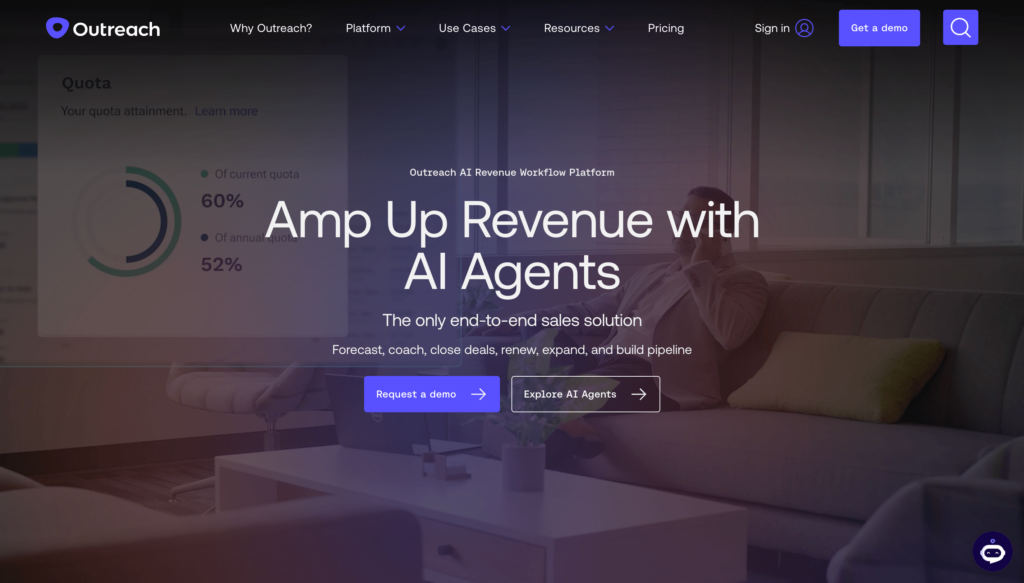
-
- What it is: A sales engagement platform that automates and optimizes prospecting workflows.
- Why it matters: Helps managers scale outbound efforts, evaluate rep performance, and forecast outcomes using AI-driven insights.
-
Key features:
- Multichannel sequencing
- Deal health scoring
- Sentiment and engagement tracking
- For example: A sales manager uses Outreach’s engagement metrics to identify which reps have stalled cadences – and jumps in to restructure their outreach strategy, improving response rates.
6. Conversica: AI virtual sales assistant
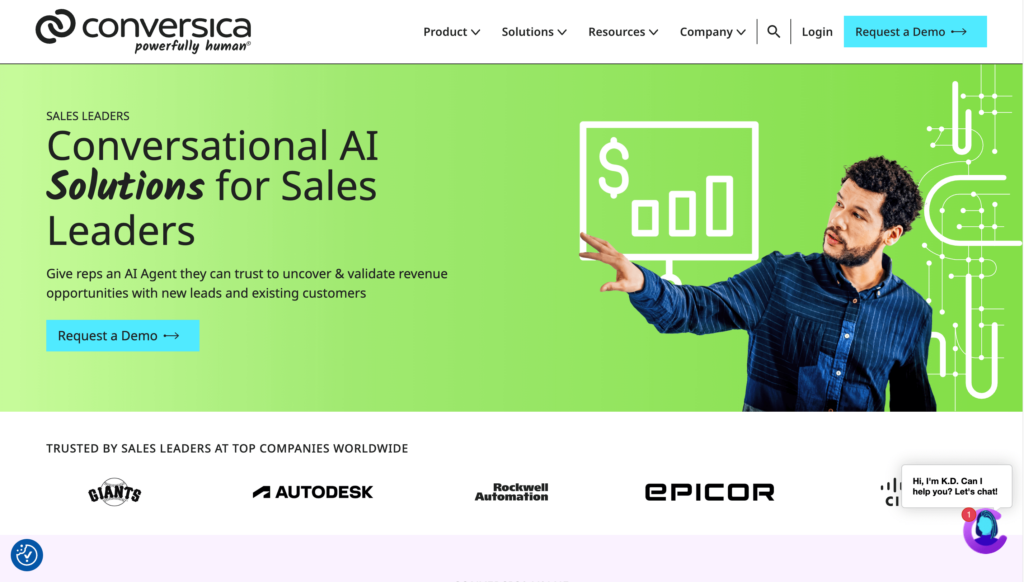
-
- What it is: An AI virtual assistant platform built to automate lead follow-up and qualification.
- Why it matters: Acts as a digital SDR, qualifying leads and surfacing sales-ready conversations without human input.
-
Key features:
- Conversational AI for email and chat
- Lead nurturing and handoff
- Integration with CRMs and marketing automation tools
- For example: A sales manager for a lean team uses Conversica to re-engage hundreds of dormant MQLs and route only the highest-intent leads to their closers.
7. Docket: AI-powered meeting intelligence
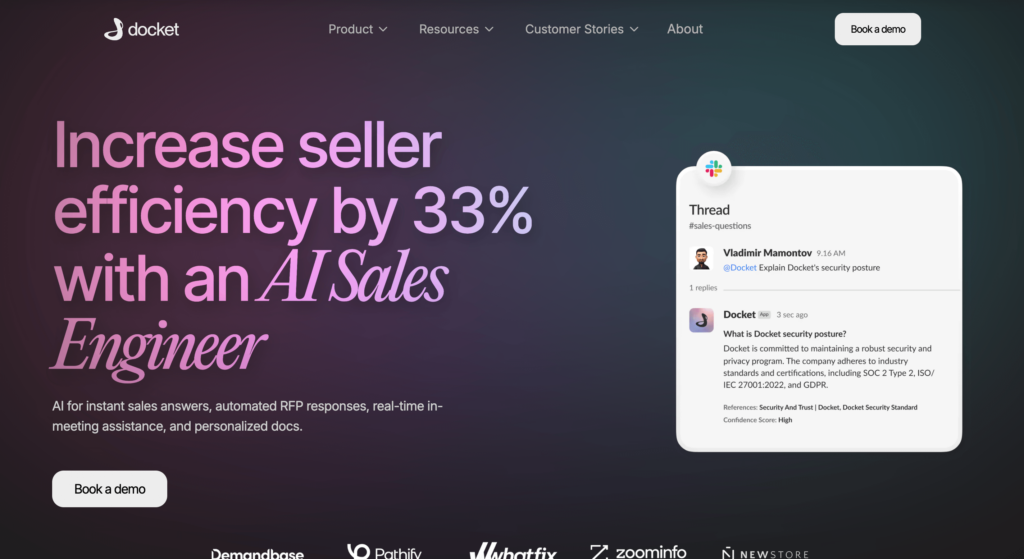
-
- What it is: A meeting productivity platform that helps teams prepare, align, and follow through on sales conversations.
- Why it matters: Reduces meeting inefficiencies for managers and ensures that coaching sessions and pipeline reviews lead to clear next steps.
-
Key features:
- Agenda templates and automation
- Meeting notes and action item tracking
- Calendar and CRM integrations
- For example: A manager uses Docket to pre-fill coaching session agendas with Gong insights and ensure that rep feedback is captured and followed up on, reducing meeting prep time.
Why Sales Managers Are Betting on AI Sales Tools (With Proof)
AI is no longer just a shiny object in the sales tech stack, and it’s proving its worth where it matters most: rep performance, forecast accuracy, and win rates. Let’s look at the data:
AI-powered coaching effectiveness
In sales, coaching is often the highest-leverage activity a manager can do, but it’s also the one that gets sidelined most. That’s changing quickly with AI-powered coaching tools.
According to a 2024 study, companies that integrated AI into their coaching programs saw a 3.3x increase in year-over-year quota attainment, a 56% reduction in sales cycle time, and a 118% improvement in average profit margins per customer. Numbers like these demonstrate the gigantic impact of AI on sales performance.
Higher win rates with AI tools
Data from Gong shows that teams using their AI features – like “Ask Anything” and Smart Trackers – achieved 26% and 35% higher win rates, respectively, compared to those without. This is because AI helps managers identify at-risk deals, coach on specific objections, and align sales rep behavior to proven patterns faster.
Improved sales time allocation
The productivity impact is also impressive. In Gong’s 2024 State of Sales Productivity report, 85% of reps said they used AI in the past six months, and reported spending 44% of their time on customer-facing work, up significantly from previous years.
That’s what makes AI tools for sales so nice: they make reps and managers more focused, more strategic, and more available to do the work that matters.
The Shift Is Inevitable – Your Advantage Is Optional
AI tools for sales managers are today’s competitive differentiator. For sales managers, they mean saving time and automating tasks. They also mean building high-performing teams: teams that are sharper, faster, and more focused on what actually drives revenue.
Let’s recap the core advantages:
- Forecasting clarity: With tools like Clari and Salesforce, managers can see deal health in real time and forecast with greater confidence.
- Stronger rep coaching: Platforms like Gong and Outreach make it easy to identify who needs help, where, and why.
- Higher win rates: The data is clear – AI helps teams win more.
The bottom line is that these tools only create an advantage if you adopt them well and lead with them. Don’t wait for the “perfect moment” or a budget cycle. The teams pulling ahead are the ones already experimenting, piloting, and optimizing.
If you’re a sales manager looking to lead the shift, start here.